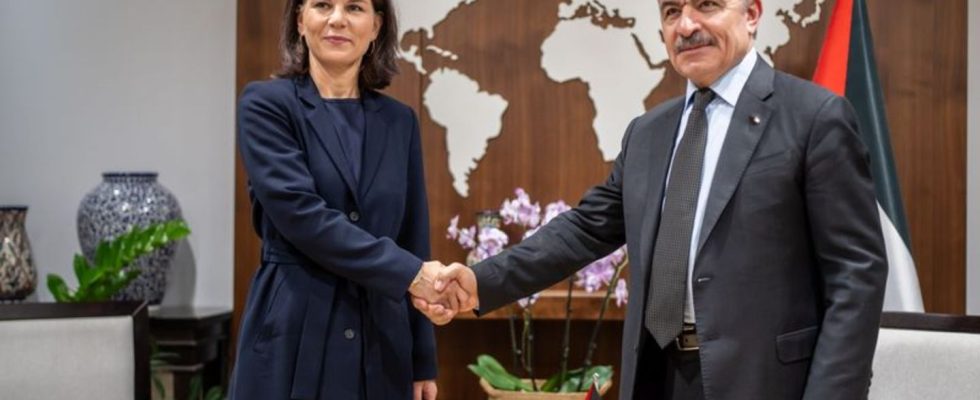Foreign Minister Baerbock is visiting Israel and the Middle East for the third time since the beginning of the Gaza War. This time she is also going to Ramallah in the West Bank. Can a wildfire be prevented?
It is a marathon of crisis diplomacy that Annalena Baerbock is completing: United Arab Emirates, Saudi Arabia, West Bank, Israel. The Foreign Minister will meet seven politicians from Friday afternoon to late Saturday. There is also time for discussions with those affected by the Islamist Hamas terrorist attacks on Israel on October 7th. The Green politician traveled to the attacked country and the crisis region for the third time in the five weeks since the Gaza war began.
The Gaza war is probably the most difficult challenge for Baerbock in her almost two years in office. Perhaps more difficult than the one she faced a few weeks after she was sworn in: the Russian war of aggression against Ukraine.
She feels that way herself occasionally. Because in Ukraine it is clear: Moscow is the aggressor, Kiev is the attacked. When it comes to the Gaza war, it is also clear: the Islamists from Hamas covered Israel with massacres and terror. But the images of dead children, women and men in the Gaza Strip shock many. Millions of Muslims react angrily and there is a risk of a conflagration.
Abu Dhabi, Riyadh, Ramallah, Tel Aviv
Baerbock meets prime ministers and colleagues almost every hour. On Friday evening in Abu Dhabi, the Foreign Minister of the United Arab Emirates, Abdullah bin Zayed Al Nahyan. On Saturday in the Saudi capital Riyadh, the Prime Minister and Foreign Minister of Qatar, Mohammed bin Abdulrahman Al Thani, and later their Saudi colleague Faisal bin Farhan Al Saud.
The meetings are important for Baerbock – Saudi Arabia and the Emirates, like Qatar, are seen as influential potential mediators, for example when it comes to the freeing of the Hamas hostages or a future peace solution using a two-state model, two of their main topics.
In Ramallah in the West Bank, Baerbock talks to Palestinian Prime Minister Mohammed Shtaje. It is intended to be a sign of solidarity in the face of many Palestinians who feel abandoned. In the evening there were meetings with three important Israelis – Foreign Minister Eli Cohen, opposition leader Jair Lapid and Benny Gantz, who is a member of Prime Minister Benjamin Netanyahu’s war cabinet.
Baerbock has repeatedly stated that Israel’s security is a German raison d’être after the Hamas terrorist attack – which, according to new estimates, left around 1,200 dead and almost 240 abducted. But the suffering of the civilian population in the Gaza Strip doesn’t leave them indifferent either. The minister describes the situation as a terrible dilemma.
Key points of the crisis mission:
Humanitarian aid to Palestinians will be increased
Germany is increasing humanitarian aid for the Palestinian territories by a further 38 million euros. This means that the Federal Republic will make over 160 million euros available for the Palestinian territories in 2023, says Baerbock. Of the 38 million euros, 25 million will go to the UN Palestinian relief agency UNRWA, 10 million to the World Food Program and almost 3 million to the UN Emergency Relief Office (OCHA).
Warning against escalating violence
It is also in Israel’s interest that the Palestinians can determine their own future in their own state, says Baerbock. “It is so important that the West Bank is not also affected by violence and destruction,” she warns. The humanitarian breaks are an important first step for the people of Gaza. “These need to be expanded further.” And more humanitarian access is needed. “What we have now is far from enough.”
“Distinguish between civilian and military targets”
In view of the worsening situation of hospitals in the Gaza Strip, Baerbock says that they are particularly protected by the Geneva Convention in armed conflicts. “Israel, like every state in the world, has to adhere to this. Just as Israel, like every other state in the world, has the right to defend itself.” If hospitals were used for military operations or as command centers, they could also lose their protected status.
Cohen later said he had asked Baerbock to continue supporting his country so that Israel could destroy Hamas and secure the release of the hostages.
Settler violence condemned
Baerbock condemns “in the strongest possible terms” the increasing violence by radical Israeli settlers. Criminal and violent acts against the Palestinian population in the West Bank must be prevented and prosecuted. “Israel has a central responsibility here to protect the Palestinian civilian population. Because settler violence also damages Israel’s security.” That also sounds like a warning to the Netanyahu government.
Prime Minister Schtaje then calls on Germany to take a clearer stance against the war in the Gaza Strip. “Supporting Israel with weapons encourages it to continue its aggression against our people in Gaza,” he said.
Meeting with relatives of victims
In Tel Aviv, Baerbock meets with an Israeli of Arab origin and the head of an organization that promotes reconciliation. His cousin was employed as a medic at the peace festival that was attacked by Hamas and was murdered. She also speaks to the son of a Jewish peace activist who was kidnapped.
Baerbock: Herculean task of building bridges
After the talks in Saudi Arabia, German delegation circles said that they agreed with the representatives of Qatar and Saudi Arabia that there could only be peace for Palestinians and Israelis with the prospect of a two-state solution. She later made it clear in two sentences that this shouldn’t be a matter of weeks or months for Baerbock: “The bridgeheads on both sides are clearly visible. The Herculean task now is to build the bridge between them.”

